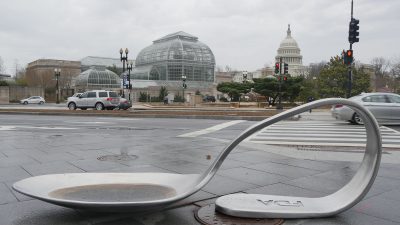A giant spoon lays on the sidewalk — bent, twisted and blackened. Within it, a pool of brown, tar-like residue is visible. At a length of 10 feet and weighing more than 800 pounds, a giant heroin spoon sculpture titled the “FDA Spoon” will be placed in front of the George Sherman Union from Oct. 10 to 25.

The opioid crisis is an epidemic that continues to take lives, with fatal opioid related overdoses being six times higher in 2017 than in 1999, according to the Center for Disease Control.
Boston-based artist and activist Domenic Esposito is using his art to bring attention to the crisis through The Opioid Spoon Project. Esposito has crafted four different, giant heroin spoons sculptures in an effort to take a stand against the pharmaceutical companies and doctors who make and prescribe the drugs in question.
Boston University will be the first university ever to host it on their campus, a decision that Esposito said he strongly supports.
“I think it’s a remarkable opportunity for us and I’m really proud of BU for doing this,” Esposito said. “It fits squarely within our mission statement because we’re really out there and part of our mission statement is to bring awareness of the opioid epidemic outside of the opioid community.”
Esposito’s connection to the opioid epidemic runs deep, as his personal struggle with his brother’s addiction served as the catalyst for the creation of The Opioid Spoon Project.
“I always wanted my art to be kind of visceral, some sort of meaning behind it,” Esposito said. “So really, kind of born out of frustration, was this idea to make this large spoon, burnt heroin spoon, mostly as a symbol and a lot of emotion around what’s been going on with my family.”
Esposito’s spoon shaped sculptures have been placed in front of various pharmaceutical corporations in the past. Spoons have been placed in front of pharmaceutical giant Purdue’s headquarters in Stamford, Connecticut and in front of the Food and Drug Administration headquarters in Washington, D.C., stamped with the FDA’s logo.
“That’s the beauty of art,” Esposito said. “ It just kind of creates a question, a discussion.”
Esposito said he believes this exhibition is a great opportunity to educate students that may not be involved in the conversation around the opioid epidemic.
“We need to start really kind of educating our new leaders on the dangers of opioids,” Esposito said, “and what they can do to fight the opioid crisis and how it got started.”
Gregory Williams, the associate department chair and a professor of contemporary art in the College of Arts and Sciences, helped jumpstart the process of bringing the FDA Spoon on campus as part of his fall course “Contemporary Art, Politics and Activism.”
“I think it’s a really smart piece because it distills a lot of ideas into one single object that functions both as an object with mass and gravity and weight,” Williams said, “but also an object that can very quickly be turned into an image.”
Ami Okazaki, a freshman in the College of Fine Arts , said she supports the project’s presence at BU.
“I think it’s a really cool project and the fact that this school is hosting it instead of going to MFA or something, I think it’s really meaningful,” Okazaki said.
In spite of the increased media attention and the call to action from President Donald Trump’s Administration, Esposito said he is frustrated with a continued lack of action.
“‘Oh yeah, there’s plenty of awareness.’ It’s like, ‘No there’s not,’” Espesito said. “ There’s still a lot of misinformation, still a lot of stigma attached with it. People think it’s a moral hazard.”
As the 2020 election nears, Esposito emphasized his frustration with the lack of attention the opioid crisis has received from the Democratic candidates on the national stage.
“They’ve not talked about it at all,” Esposito said. “I mean, all you had was a mention early on about it, very early. In the last debates [there] has been no discussion about it at all. Right? So you have half a million deaths, the single largest public health crisis that this country has ever witnessed. The sheer amount of deaths is the highest. And we’re not even debating it.”
In honor of National Newspaper Week, we’re asking you to make a donation to The Daily Free Press. The financial support of our community is important now more than ever to help us continue writing stories like this for readers like you. Please chip in whatever you can. Read more and make a donation here. Thank you.

























































































































Ty Furman • Oct 10, 2019 at 10:13 am
Thanks for covering this important installation. The installation was coordinated by the BU Arts Initiative, BU Art Galleries, and History of Art & Architecture in CAS.